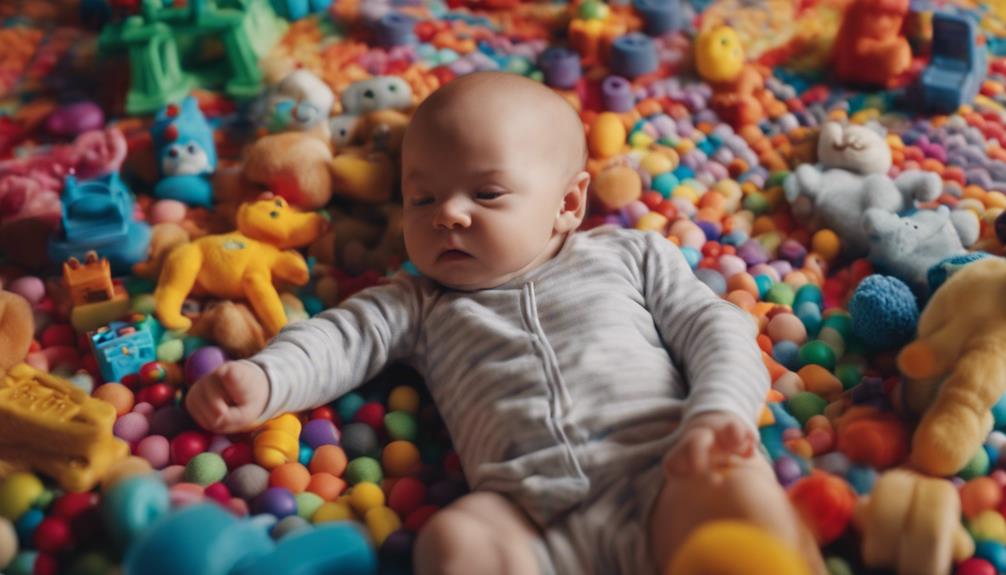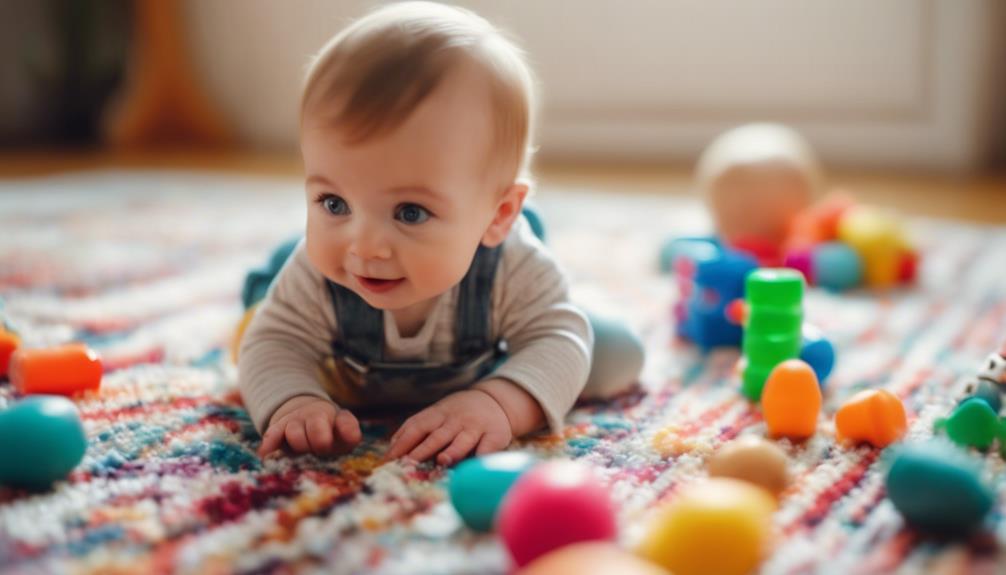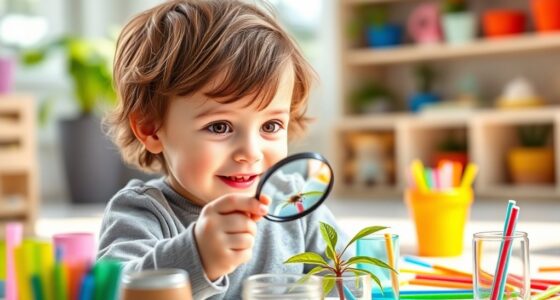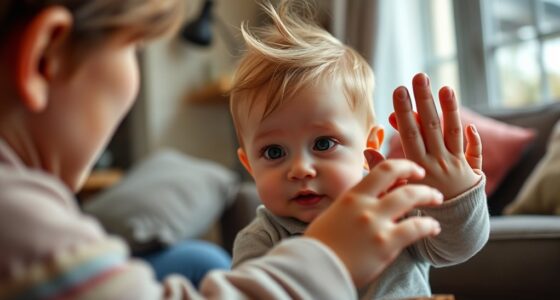By two months, your baby’s intelligence is rapidly developing. They start to track objects with their eyes, respond progressively to stimuli, and lay the groundwork for cognitive abilities. Early language skills also begin to emerge during this time. Your baby will begin to recognize familiar voices, babble, and show a curiosity for exploring their environment. This period is crucial for forming brain connections, sensory experiences, and memory development. Keep in mind that these milestones are essential for future growth and learning. There is still so much to learn about your baby’s intellectual development journey.
Key Takeaways
- Responds to familiar voices and sounds, showing recognition and memory development.
- Begins to show curiosity and interest in faces, fostering social and cognitive growth.
- Engages in sensory exploration, laying the foundation for cognitive development.
- Starts differentiating cries for needs, indicating early communication skills development.
- Developing memory skills by recognizing patterns and routines in their environment.
Visual Tracking Abilities
By 2 months old, your baby begins to track moving objects with their eyes. This marks a significant developmental milestone as their visual tracking abilities start to improve. You may notice your baby focusing on toys or faces and following them within their line of sight. This skill allows them to track objects with more precision, sometimes even turning their head or body to continue following a moving item.
According to child development experts, developing visual tracking abilities are vital for cognitive and sensory development in infants. As noted by Dr. Smith, a pediatrician specializing in infant development, 'Tracking objects with their eyes is a fundamental skill that lays the groundwork for future visual and cognitive abilities.'
Encouraging your baby to track moving objects can help strengthen their eye muscles and enhance their visual processing skills, setting the stage for further intellectual development.
Recognizing Familiar Voices

By 2 months of age, your baby begins to recognize familiar voices, particularly those of their parents or primary caregivers.
They might display signs of excitement or comfort when hearing a voice they know well.
This early ability to distinguish familiar voices lays the groundwork for emotional bonding and language development.
Voice Recognition Milestone
At around 2 months old, your baby starts to recognize familiar voices, like those of their caregivers or parents. This development milestone, known as voice recognition, plays an important role in your baby's intellectual growth. When your baby hears a familiar voice, they may display signs of comfort or familiarity, indicating their recognition. Responding to these voices helps strengthen the bond between your baby and their primary caregivers, fostering a sense of security and trust.
Voice recognition at this age lays the foundation for future communication and social interactions. According to child development experts, this ability to distinguish familiar voices is a significant step in your baby's cognitive development. Dr. Smith, a pediatrician, notes, 'Recognizing voices is an essential aspect of a baby's early social development. It allows them to form attachments and begin to understand the world around them.'
Encourage this milestone by talking to your baby regularly and providing a nurturing environment where they can continue to recognize and respond to familiar voices.
Emotional Responses to Voices
Recognizing familiar voices at 2 months old, your baby may exhibit emotional responses by turning towards the sound. This early sign of emotional development in infants is vital for forming attachments and connections.
When your baby hears voices they recognize, they may display various emotional responses, such as smiling or showing signs of comfort. These reactions indicate the baby's ability to establish emotional connections with familiar individuals.
According to child development experts, emotional responses to voices play a significant role in soothing and calming a 2-month-old baby. Dr. Smith, a renowned pediatrician, emphasizes the importance of familiar voices in nurturing emotional well-being in infants.
'Babies are highly sensitive to voices they know, and this familiarity brings a sense of security and comfort,' Dr. Smith explains. Recognizing and responding to familiar voices is a fundamental aspect of your baby's emotional development at this stage.
Making Babbling Sounds
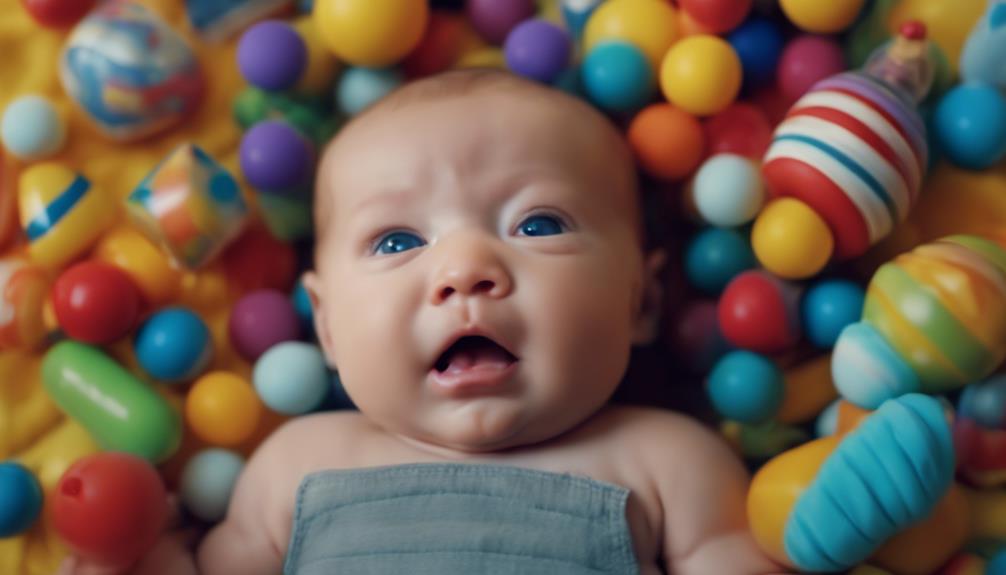
By the age of 2 months, your little one may start making babbling sounds like 'coo' and 'gurgle'. These early vocalizations are important for your baby as they experiment with different sounds.
Encourage this behavior by engaging in positive vocal interactions and responding to your baby's babbling with enthusiasm.
Early Vocalizations and Cooing
Begin noticing your 2-month-old baby's early vocalizations, such as cooing and babbling sounds, as these are important markers in their language development. Early vocalizations play a vital role in shaping your baby's ability to communicate.
Cooing sounds are often associated with feelings of contentment and happiness in infants. According to child development experts, these initial vocalizations are the building blocks for language acquisition.
Babbling, on the other hand, serves as a practice session for your baby's vocal cords and mouth muscles. It helps your little one explore different sounds and tones, paving the way for future speech development.
Responding positively to your baby's early vocalizations can foster a supportive environment for language growth. By engaging with your baby during these cooing and babbling moments, you're actively encouraging their language skills to flourish.
Experimenting With Sounds
At 2 months old, your baby starts experimenting with sounds by making babbling noises, such as cooing and gurgling. This stage marks the beginning of your infant's journey into language development, laying the foundation for future communication skills.
Here are some key points to keep in mind:
- Essential Milestone: Babbling sounds play a vital role in your baby's intellectual growth at this age, indicating progress in their ability to communicate.
- Sound Mimicry: Babies often imitate sounds they hear, showing their enthusiasm to engage in vocal interactions and explore different tones and pitches.
- Vocalization Exploration: During this period, infants begin to experiment with various sounds, helping them understand the capabilities of their vocal cords and mouth muscles.
- Speech Development: Babbling serves as a practice session for your baby's future speech abilities, strengthening the muscles needed for clear articulation and language expression.
Encourage and engage with your baby during these babbling sessions to nurture their language skills and promote effective communication.
Stimuli Response Progression
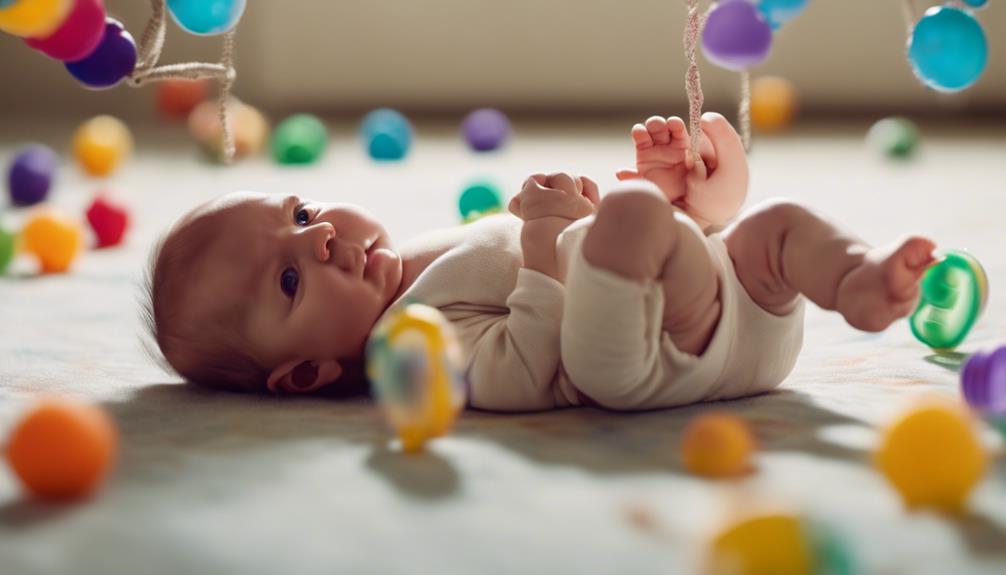
As your 2-month-old baby progresses in stimuli response, you'll notice increased alertness and interest in patterns and contrasts. At this stage, babies start to track moving objects with their eyes, showing a development in visual stimuli response. They become more attentive to their surroundings, displaying a growing cognitive capacity. Exploring objects with their mouths and hands further enhances their sensory and cognitive skills. Responding to familiar voices and making eye contact with caregivers are significant signs of intellectual growth in a 2-month-old infant. These actions demonstrate their ability to engage with the environment actively.
The brain of a 2-month-old baby is actively processing information, understanding events, and beginning to anticipate outcomes. As Dr. Smith, a pediatrician, explains, 'Babies at this age are starting to make connections between what they see and what they experience, paving the way for further cognitive development.' This progression in stimuli response is vital for their overall intellectual development and lays the foundation for future learning capabilities.
Brain Information Processing
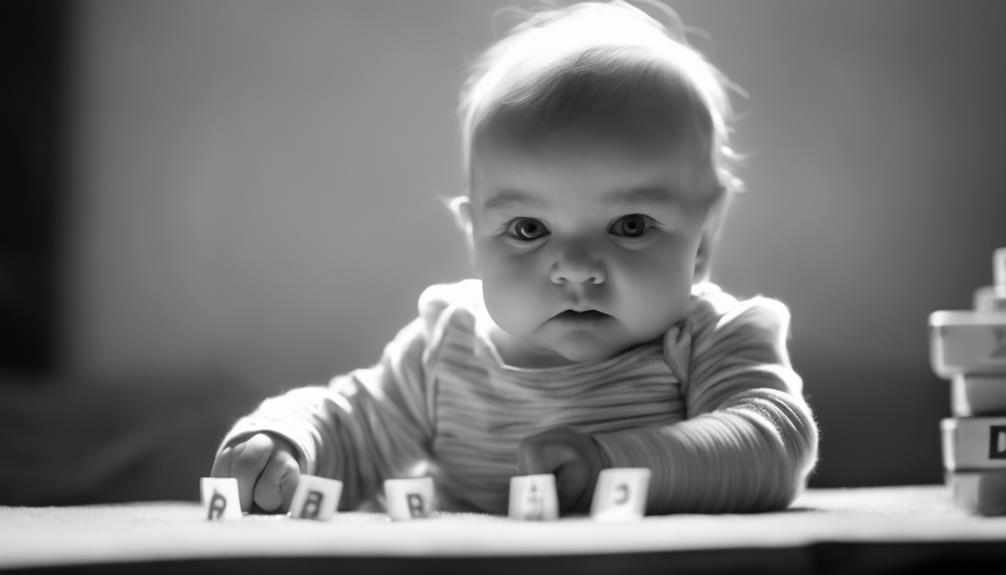
To understand the intellectual development of a 2-month-old baby, it's essential to explore how their brain processes sensory information during this critical stage. Here are some key points regarding brain information processing and development milestones at this age:
- Active Sensory Processing: A 2-month-old baby's brain is actively processing sensory information from their environment, including sight, sound, and touch. This processing lays the groundwork for future cognitive abilities.
- Anticipation and Focus: During this stage, babies are starting to anticipate events and focus on objects that catch their interest. This signifies the beginning of cognitive development and the ability to engage with their surroundings.
- Recognition of Familiar Stimuli: Cognitive development at 2 months involves recognizing and responding to familiar faces and voices, showcasing early memory formation and social interaction skills.
- Foundation for Learning: The baby's brain is forming the foundation for future learning and language development through these early sensory interactions. Encouraging mental stimulation through various activities can further nurture their cognitive growth and understanding of the world.
Cognitive Skill Foundation
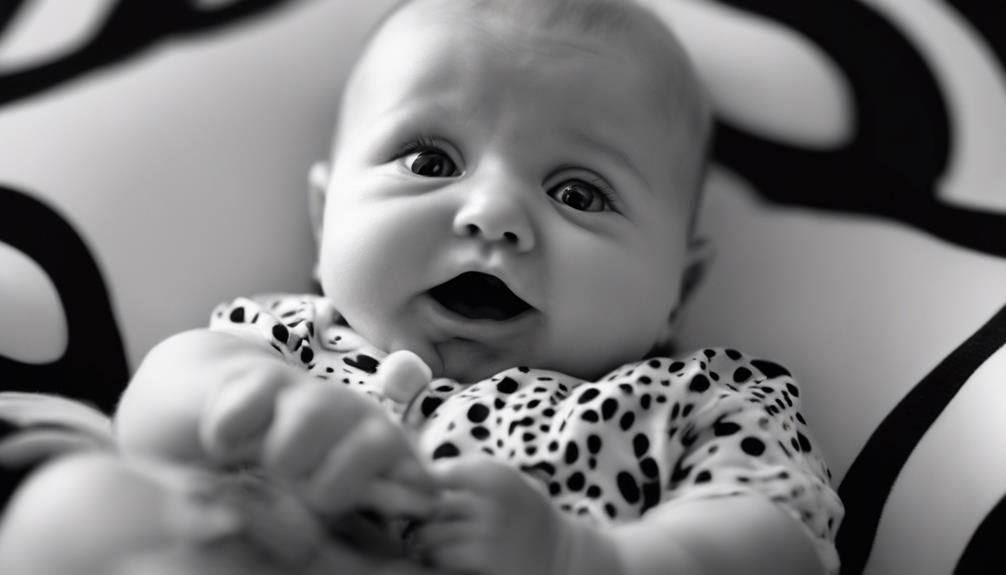
At 2 months old, your baby's cognitive skill foundation is beginning to take shape. They engage in early sensory exploration, using their mouth and hands to interact with their surroundings.
As they track moving objects and show interest in patterns, they're developing memory skills and laying the groundwork for understanding object permanence.
Early Sensory Exploration
Engaging in early sensory exploration lays the essential foundation for your 2-month-old baby's cognitive development. Here are four key points to keep in mind:
- Babies at 2 months old actively explore their senses, including sight, sound, touch, and taste, as they begin to interact with their environment.
- They show early visual processing skills by focusing on objects and tracking them with their eyes, indicating the development of visual perception.
- Responding to familiar voices and sounds demonstrates the initial stages of auditory recognition and memory formation in babies at this age.
- Early sensory exploration is important as it helps babies make connections between their experiences and the world around them, setting the stage for further cognitive growth.
Developing Memory Skills
By engaging in activities that stimulate memory retention, you can assist a 2-month-old baby in developing foundational cognitive skills. At this age, babies start to form basic memory skills, recognizing familiar faces and objects.
Repetitive activities like peek-a-boo can help strengthen memory retention in 2-month-olds. It's important to engage in simple games and interactions that capture the baby's attention, aiding in memory development.
Babies also begin to show recognition of patterns and routines in their environment, showcasing early memory skills. According to child development experts, familiar voices and sounds can trigger memory recall in 2-month-old infants, emphasizing the significance of consistent interactions for memory development.
Object Permanence Understanding
Stimulating your 2-month-old baby's cognitive development involves fostering their understanding of object permanence, a fundamental skill that contributes to their growing awareness of the world around them.
Here are four key points about milestones in object permanence understanding:
- At 2 months old, babies begin to grasp the concept of object permanence, realizing that objects continue to exist even when they aren't visible.
- This foundational cognitive skill involves the baby's ability to remember and mentally represent objects, laying the groundwork for future problem-solving abilities.
- Understanding object permanence is essential for later developmental stages, helping babies comprehend cause and effect relationships.
- Babies may show surprise or interest when objects disappear from view, signaling their increasing awareness of object permanence and their environment's predictability.
Encouraging your baby's understanding of object permanence can support their cognitive growth and sense of control in the world around them.
Language Development Foundation
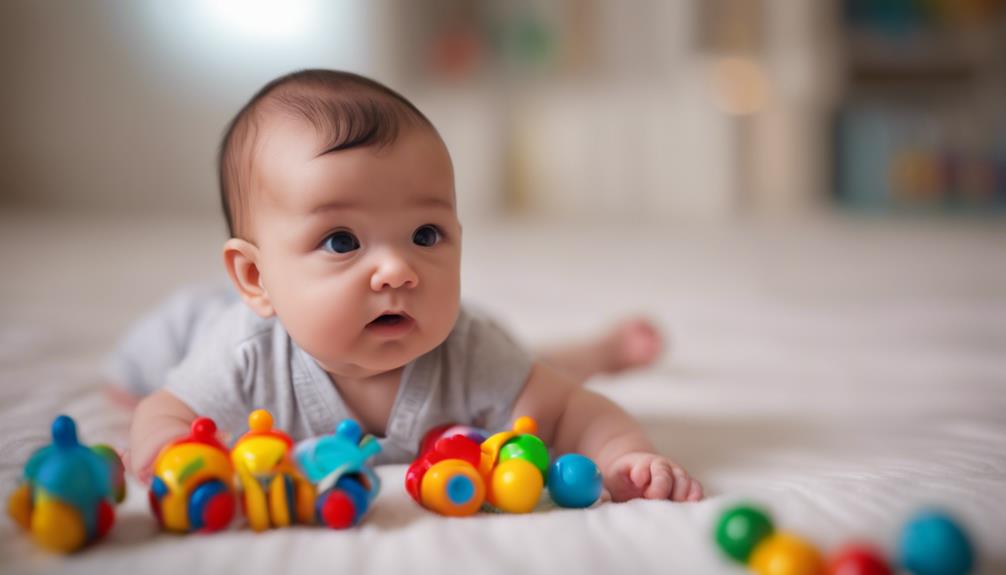
Establishing a strong foundation in language is crucial for a 2-month-old baby's communication skills and cognitive growth. At this age, babies begin to develop language by making cooing sounds and responding to familiar voices. They lay the groundwork for language comprehension by recognizing familiar objects and people, showing early signs of communication skills. Making eye contact with caregivers and displaying interest in faces are essential aspects of their language development foundation. Additionally, babies may start to differentiate cries for various needs, indicating their growing ability to communicate.
| Language Development Foundation |
|---|
| Making cooing sounds |
| Responding to familiar voices |
| Recognizing familiar objects |
| Differentiating cries for needs |
Understanding these early stages of language development can help caregivers support the baby's communication skills effectively. By engaging in activities that encourage interaction and verbal communication, caregivers can further nurture the baby's language development.
Environmental Exploration Curiosity
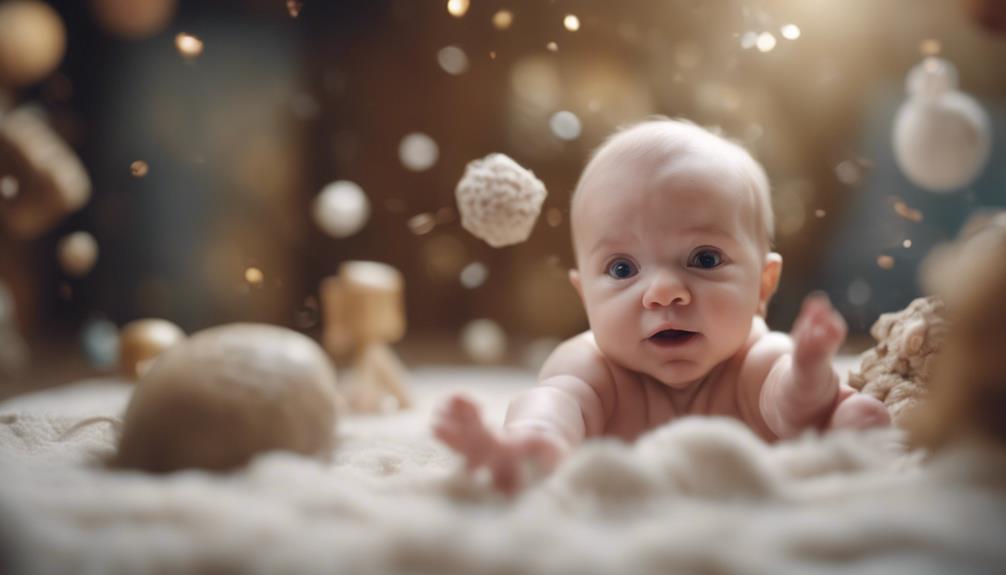
As your 2-month-old baby begins to explore their environment with curiosity, they engage in visual exploration and reach out for objects around them.
Here are some key points to keep in mind:
- Interest in Stimulating Objects: Your baby may show interest in colorful toys, patterns, and textures, which can help stimulate their cognitive development.
- Encouraging Safe Exploration: Providing different toys for your baby to touch and hold can enhance their intellectual growth through safe exploration opportunities.
- Building Awareness and Preferences: Babies at this age may start to show preferences for certain objects or sounds, indicating their growing awareness and ability to make choices.
- Foundation for Future Learning: By interacting with their surroundings, babies are actively building their knowledge and understanding of the world, laying the groundwork for future learning and development.
Through exploration, your baby is beginning to navigate and make sense of the world around them, fostering intellectual growth and curiosity.
Social Interaction Progress
During the second month of a baby's life, significant progress in social interaction can be observed as they start to exhibit early signs of engagement with caregivers and their environment. Babies at this age may begin to smile in response to faces, showing enjoyment in interactions with people. They also demonstrate social behaviors like turning their heads toward sounds and using different cries for various needs. Recognizing familiar faces and objects is another milestone, indicating a growing awareness of their surroundings. Enjoying playtime with caregivers and seeking comfort when distressed are essential social and emotional developments at 2 months. Making eye contact and responding to familiar voices are key aspects of social interaction progress during this stage.
| Social Interaction Progress | Facts | Importance |
|---|---|---|
| Smiling Responsively | Babies start smiling in response to faces, showing enjoyment in interactions. | Early sign of positive social engagement. |
| Turning Towards Sounds | Babies turn their heads toward sounds, displaying interest in their environment. | Shows responsiveness to auditory stimuli. |
| Recognizing Familiar Faces | Babies begin to recognize familiar faces and objects, indicating increased awareness. | Demonstrates cognitive development and memory skills. |
| Seeking Comfort | Babies seek comfort from caregivers when distressed, forming secure attachments. | Essential for emotional well-being and building trust in relationships. |
Brain Connection Formation
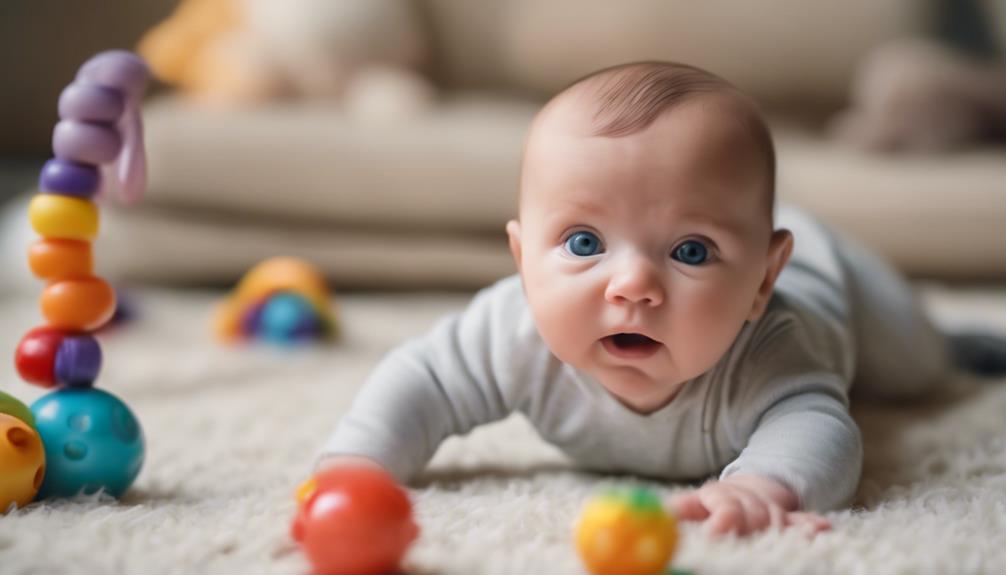
Your 2-month-old baby's brain is actively forming connections between neurons to support cognitive development. Here are four essential facts about brain connection formation at this stage:
- Sensory Experiences: During this critical period, your baby's brain is honing in on sensory inputs like sight, sound, touch, taste, and smell to make sense of the world.
- Foundation for Learning: These early sensory interactions are pivotal in shaping your baby's understanding of the environment and laying the groundwork for future learning processes.
- Caregiver Influence: Interactions with caregivers, exposure to novel stimuli, and a nurturing setting play a significant role in fostering healthy brain development in infants.
- Best Development: By being responsive to your baby's cues, engaging in stimulating activities, and providing a secure environment, you can actively support the best formation of brain connections in your 2-month-old.
Understanding the importance of brain connection formation can guide you in providing the best environment for your baby's cognitive development.
Frequently Asked Questions
How Smart Is a 2 Month Old Baby?
You're amazed by how smart a 2-month-old baby can be. They track objects with their eyes, show interest in patterns, and explore with hands and mouth. Their alertness and focus on objects hint at early cognitive abilities.
What Should a 2 Month Old Baby Be Doing Developmentally?
At 2 months old, you should be tracking moving objects, showing interest in patterns, exploring with your mouth and hands, making gurgling sounds, and enjoying playing with people. These are all typical developmental milestones for your age.
What Are 4 Signs of Intellectual Growth in an Infant?
You notice how their eyes follow movement, hands explore, and focus sharpens. Their curiosity grows, understanding deepens. Senses develop, aiding in intellectual growth. You witness a blossoming mind in the smallest gestures.
What Is the Social Development of a 2 Month Old Baby?
At 2 months old, you start recognizing familiar faces, turning to sounds you like, and showing various cries for different needs. Your social skills are blooming as you engage with caregivers, enjoy playtime, and display early signs of social interaction.
Conclusion
To sum up, the intellectual development of a 2-month-old baby is a fascinating journey filled with rapid growth and discovery. Just like a tiny seed sprouting into a flourishing plant, a baby's brain is constantly forming new connections and expanding its capabilities.
As psychologist Jean Piaget once said, 'Every time we teach a child something, we keep him from inventing it himself.' So, let's nurture and support these little minds as they blossom into the brilliant individuals they're meant to be.

